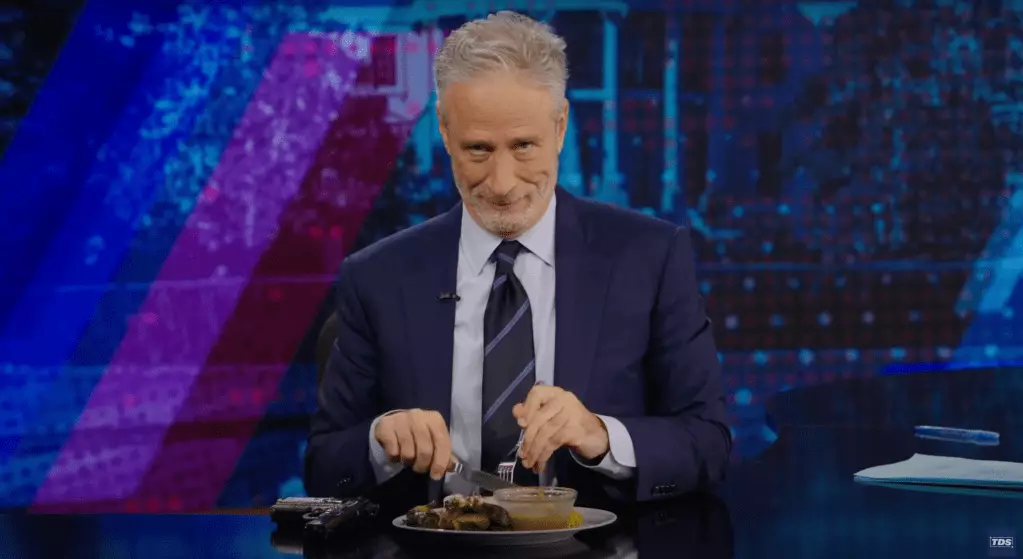Jon Stewart, widely recognized for his sharp comedic style and insightful political critiques, recently took to his platform, The Daily Show, to navigate the complex realms of political maneuvering and family dynamics within the Biden family. In a unique blend of humor and social commentary, Stewart portrayed himself as Hunter Biden during a fictional Thanksgiving dinner, infusing a comedic narrative that highlighted the absurdities of contemporary politics. Through this humorous lens, he provided an insightful critique of political pardon dynamics, particularly focusing on the implications of President Joe Biden’s approach to his son’s legal challenges.
Stewart’s portrayal of Hunter Biden is particularly noteworthy as it embodies both the nuance of familial ties and the often absurd nature of political relationships. By leveraging humor, Stewart crafts a narrative where Hunter’s sly hints at a Christmas pardon serve as a representation of the broader issues around accountability and justice. This comedic setup serves to underscore the often political relationships that underpin familial connections, especially in the context of legal trouble.
The comedic elements extend far beyond mere impersonation; Stewart wields sarcasm as an effective tool to critique the political landscape. His opening remarks set a critical tone, as he delves into the alarming appointment of Kash Patel as FBI director. Patel, known for his conspiracy theories and unwavering loyalty to Donald Trump, embodies the kind of political choice that Stewart deftly lampoons, invoking both laughter and introspection within his audience.
As Stewart discusses Patel’s recent work, particularly a children’s book series titled “The Plot Against the King,” he parodies classic poetry to draw comparisons between fantastic tales and the bizarre narratives that permeate contemporary political discourse. Stewart’s clever reimagining of Dr. Seuss highlights the absurdity of the claims made by figures within Trump’s orbit, effectively critiquing the simplistic narratives often presented to the public. Here, humor functions as a vehicle for deeper understanding, making complex political issues more accessible to a wider audience.
Stewart’s attention eventually turns to the act of pardoning, specifically referencing President Biden’s decision to pardon his son, Hunter. This moment in the monologue serves as a pivot, shifting from humor to a more poignant reflection on familial loyalty and the implications of political pardons. In his distinctive style, Stewart expresses incredulity at the sweeping nature of the pardon, which encompasses offenses that Hunter may have committed over a period of eleven years. He emphasizes the ambiguity surrounding such pardons, likening it to a gentle pat on the back from a father to a son, disregarding the broader implications of accountability and legality.
The humor laced in Stewart’s delivery does not diminish the gravity of the issue at hand. Instead, it offers a critical perspective on how political power can influence personal matters, particularly within a family embroiled in significant legal and public scrutiny. By openly mocking the parameters of the pardon and the lack of specificity, Stewart draws attention to the nuances of privilege and the often blurry lines that define accountability in political realms.
Ultimately, Stewart’s monologue serves as powerful commentary not only on the Biden family and their complicated dynamics but also on a political culture that often prioritizes loyalty over accountability. As he cultivates laughter from absurd political situations, he simultaneously fosters critical thinking among his audience. Stewart’s unique ability to intertwine humor and politics mirrors the very nature of public discourse, where satire often serves as a precursor for deeper societal reflections.
This latest installment of The Daily Show encapsulates Stewart’s longstanding legacy of using comedy as a lens through which to view the complexities of politics. The myriad threads of familial loyalty, political maneuvering, and accountability converge in an engaging narrative that humorously reveals the inconsistencies of contemporary governance, prompting audiences to grapple with challenging questions that lie at the heart of societal values and justice.

